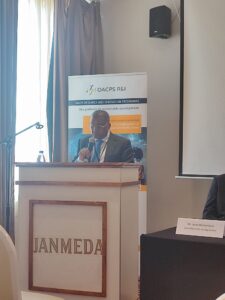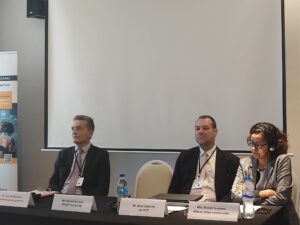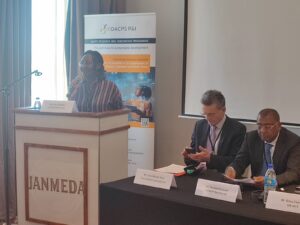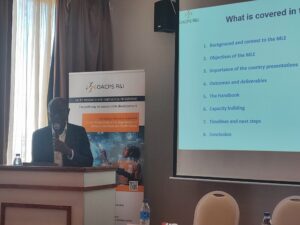A dozen countries will exchange knowledge and experience on how to successfully develop and implement R&I policies and strategies during this seven-month service.
Around 45 participants attended the opening ceremony of the first Policy Support Facility (PSF) Mutual Learning Exercise (MLE), co-organised with the UN Inter-agency Task Team (UN-IATT) on Capacity Building on Science, Technology and Innovation (STI) for the Sustainable Development Goals (SDGs).
This MLE gathers representatives from over a dozen countries that have been assisted in reforming and enhancing their national R&I ecosystems by either the OACPS R&I Policy Support Facility or by UN agencies on Capacity Building in Science, Technology and Innovation (STI) for SDGs.
In his welcome speech, Mr. Ibrahim Norbert Richard, Assistant Secretary General of the Organisation of African, Caribbean and Pacific States (OACPS), highlighted the interest of this practical and mutual approach. “We need well-defined, results-oriented research and innovation policies and strategies to focus efforts where they are most needed, in order to achieve Sustainable Development Goals. Each national R&I system is unique and requires context-specific responses. But many countries share common challenges. And this event provides a unique opportunity to learn from each other and to find sustainable solutions to common challenges together, looking at the same issues from different perspectives.”

Mr. Jean-Michel Sers, Policy Officer from the European Commission’s DG INTPA, reminded that this new and innovative Facility, funded by the European Union, “rightly complements the innovation projects financed by the ACP Innovation Fund, by offering guidance and policy recommendations for efficient policies and strategies in R&I.”


Speaking on behalf of the UN TFM IATT Work Stream 6 on capacity-building for STI, Mr. Dimo Calovski underlined the fact that to address global and urgent challenges “ The knowledge and technologies to do so, exist, and have never been easier to access, in part due to digital technologies and ICTs. However, technologies that require physical deployment in SDG-relevant sectors such as energy, agriculture, or water and waste management, require funding and resources. What is needed are well-structured and supported STI policies (…) and strong capacity to design and deploy STI policy.”
Representing the African Union Commission, Mrs. Mahlet Teshome, mentioned how “such initiatives align with the implementation mechanisms of the AU Agenda 2063, by setting a strong knowledge management system that enhances the quality of delivery through learning by doing, cutting-edge research, innovation, and codification of ground-breaking experiences and truly promoting communities of practice mentioned. “


The MLE event is composed of two parts: a knowledge exchange meeting, followed by 2 days of capacity building.
Carried out by high-level international experts, this first mutual learning exercise will contribute to, among others:
- identifying good practices, lessons learned and success factors based on robust evidence;
- exploring the best ways to respond to current and future challenges;
- address specific issues (monitoring, funding and incentives , etc.).
+ info on this service on our OACPS website: http://ow.ly/gpb850MRBOi
+ info on the two parts of this event on the UN IATT webpage: http://bit.ly/3Iofdao
The OACPS Research and Innovation Programme, implemented by the OACPS Secretariat with financial support from the European Union, contributes to unlock innovation in African, Caribbean and Pacific countries, through:
- An Innovation Fund to foster a conducive R&I environment;
- A Policy Support Facility to enhance the quality and efficiency of R&I systems;
- An interactive Web Portal to cross-fertilise knowledge and experiences.
